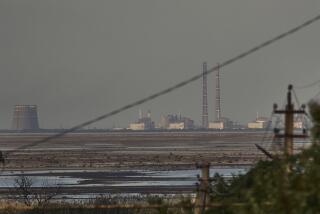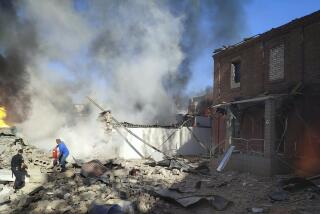Soviets Cancel Plans for 2 New Reactors at Chernobyl
- Share via
MOSCOW — The Soviet Union has canceled plans to construct two more reactors at the stricken Chernobyl nuclear power station and has halted expansion of all similar plants for safety reasons, the Tass news agency said Thursday.
The decision was announced six days before the third anniversary of the accident at Chernobyl, 60 miles north of Kiev in the Ukraine, that killed 31 people in the world’s worst civilian nuclear disaster.
Plans to construct two additional reactors at the facility had been suspended since the explosion of the No. 4 reactor spread a cloud of radiation over Eastern Europe on April 26, 1986. The No. 4 reactor is now sealed in concrete.
Addition of No. 5 and No. 6 reactors to the three-reactor plant would have made it the biggest atomic energy station in the world.
“The Council of Ministers has adopted an unequivocal decision to abandon the construction of the fifth and sixth power blocks of the Chernobyl nuclear power station on which work had been suspended after the Chernobyl accident,” Tass said. “In addition, no plans will be made to expand other power stations now in operation that use the RBMK (graphite) reactors. Unlike Western reactors, the graphite RBMKs can be refueled without being shut down for months at a time.”
The agency said the other stations are at Kursk, in central Russia, and near the western city of Smolensk.
The graphite system is inexpensive and simple because the reactor is made of piles of graphite blocks with interconnecting water-cooling pipes. It is hard to maintain, however, because the hundreds of thousands of pipe connections could develop leaks.
The Soviet Union has 45 nuclear reactors in operation at 16 locations, and another 34 plants are under construction at 15 locations, according to official figures.
The government has decided to rebuild power blocks that were constructed in the 1970s and are now operating, Tass said. The reconstruction will take place between 1989 and 1994, Tass said.
“These and all the newly constructed power blocks will be equipped with additional safety systems, which ensure safe cooling in case of an emergency,” Tass said.
The new systems will allow inspectors to contain any radioactive leaks from the reactor complex, Tass said. Soviet engineers will have designs by the mid-1990s for a new generation of power stations.
More to Read
Sign up for Essential California
The most important California stories and recommendations in your inbox every morning.
You may occasionally receive promotional content from the Los Angeles Times.













